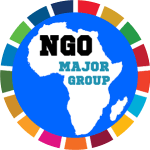UN NGO Major Group for Africa is one of the nine Ngo Major Groups around the world. The Ngo Major groups work as facilitator of engaging different NGOs from all around the world in all related aspects of the High Level Political Forum.
The UN NGO Major Group for Africa will engage on all aspects of UN agenda that affect our development. This includes, but is not limited to General Assembly second and third committees (including SDG Agenda, Climate Change and Financing for Development), UN Agencies, as well as other Member State engagements that have a direct bearing on the continent.
There are NGO Major Groups in Africa, Asia, the Caribbean, Europe, and North America. And in Africa there are five Regional Partners : Northern Africa, Southern Africa , Western Africa , Eastern Africa , and Central Africa.
-Ayman Okeil (Northrem Africa Regional Organizing Partner)
-Judith Kaulem (Southern Africa Regional Organizing Partner)
– Henry Oriokot (Eastern Africa Regional Organizing Partner)
– Kofi Kankam (Western Africa Regional Organizing Partner)
– Bernard Luttete (Central Africa Regional Organizing Partner)
-Our vision, mission and focus areas
Vision : In line with the UN 2030 Agenda for Sustainable Development, Africa Union Agenda 2063 and aspirations of the citizens of Africa, the NGO Major Group for Africa seeks to see a vibrant Africa -rooted and actively engaged Civil Society, working collectively and in partnership with African Governments and other development partners for an inclusive and sustainably developed continent.
We see our role as that of catalysts, mobilizers and partners of the Africa peoples and governments. We also see ourselves as faithful representatives of the voice of citizenry, offering space and platforms for citizens’ voice to reach and influence United Nations Development Agenda at all levels. In this regard, while we acknowledge the role of the Sustainable Development Process, we see our citizens making impact across the entire United Nations systems, including, but not limited to Member States, Regional and other Intergovernmental blocs, United Nations Organs and its various General Assembly Committees, and the United Nations Agencies.
Mission: We will seek to effectively mobilize, support and engage Africa CSOs and its stakeholders to influence the Political and Development agendas of the AU and UN.
This vision and Mission is guided by the understanding that Africa is by far the most affected by decisions and processes at the United Nations. We are also the most in need of collaboration and partnerships, considering the vast number of issues facing the continent, the multiple UN actors on the continent as well as the presence of several facets of Civil Society.
Focus areas: In developing the core focus areas for the NGO Major Group for Africa, it was acknowledged that Civil Society across Africa do not have multiple representations across various UN Departments and systems.
For more information about the group :
Major Groups
According to, The Earth Summit – the first United Nations Conference on Environment and Development in 1992-, Sustainable development would require the active participation of all sectors of society and all types of people. Due to agenda 21 that adopted at the conference, there are nine sectors of society which considered as the main channels that facilitate a broad participation in UN activities related to sustainable development. These are officially called “Major Groups”, and include the following sectors:
- Women
- Indigenous Peoples
- Local Authorities
- Children and Youth
- Non-Governmental Organizations
- Business and Industry
- Workers and Trade Unions
- Scientific and Technological Community
- Persons with disabilities
- Farmers
The Rio+20 Conference was held after the Earth Summit by two decades. In that conference, there was a reaffirmation on the importance of effectively engaging these nine sectors of society. the important outcome document of the conference is “The Future We Want”. This document emphasized on the role of Major groups in pursuing sustainable societies for future generations.
Moreover, other stakeholders have a role to play. As local communities, volunteer groups and foundations, migrants and families, as well as older persons and persons with disabilities, can participate in UN processes related to sustainable development. This participation can be activated through close collaboration with the Major Groups.
Furthermore, Major Groups and other stakeholders exhibit a high level of engagement with intergovernmental processes at the UN. The UNDESA/Division for Sustainable Development (DSD) urges and lead their interpretation to intergovernmental processes on sustainable development.
Finally, member states decide on the patterns of of the participation of MGoS. So, the involvement and participation of the global MGoS in intergovernmental processes related to sustainable development varies according to the theme of sustainable development that under discussion.
For more information about Major Groups visit : https://sustainabledevelopment.un.org/majorgroups/about
– History of NGO Major Group
Engagement of Civil Society with the United Nations system has been ongoing for several years now. However the Commission on Sustainable Development strengthened this engagement when an agreement was reached by member states to establish civil society engagement under the Major Groups Clusters. This engagement was reaffirmed and expanded in the Rio+20 Outcome Document, with the Major Groups now including other stakeholder Groups such as Persons with Disability, the aged and Volunteer Groups.
The 2030 Agenda for Sustainable Development, in line with Commitment a made in Rio, allowed a self organizing mechanism for the Major Groups with the support of DESA. The NGO Major Group , in line with this principle of self organizing, created Regional Organizing Partners engagement framework to represent regional issues while also acting as a shared leadership and learning platform for the NGO Major Group.
Africa requested the NGO Major Group membership to be allowed to elect sub-regional representations.
Between July 2017 and January 2018 a consultative process of nominations to the Africa NGO Major Group Representation was conducted, with both DESA and the Global NGO Major Group accepting to support the process. This done through an open call to all the over 800 accredited NGOs as well as all NGOs that had over the years expressed an interest or engaged with the Global NGO Major Groups. The call was also sent out to regional civil society networks across Africa. This led to the nomination and later an appointment of five Representatives to the Africa NGO Major Group, as well as the agreement to have the MENA Regional Representative and some NGOs with knowledge of the CSO engagement, observer status.
In March 2018, the NGO Major Group for Africa met formally for the first time in Cairo, Egypt and agreed on a strategic framework as well as Governance and Institutional structures.
Role in the United Nations
The NGO Major Group for Africa will therefore play a larger role beyond engagement with the Sustainable Development Agenda. The UN General Assembly, for instance, has established seven committees including:
- United Nation’s Economic and Social Council (ECOSOC) a United Nations’ platform deliberates on sustainable development,
- United Nation’s General Assembly committee on social, humanitarian affairs and human rights issues also called the 3rd Committee ,
- United Nation’s High-level Political Forum on Sustainable Development (HLPF)
- United Nation’s Department of Economic and Social Affairs (DESA)
- United Nation’s Non-Governmental Liaison Service (UN-NGLS) , an inter-agency programme of the United Nations which is mandated to develop constructive relations between the UN and civil society organizations can engage with The Africa Major Group as the. All the work of NGOs falls under the 3rd committee out of the seven while the other 6 remain largely unknown.
Businesses and Intergovernmental institutions such as the World Bank also have a direct engagement space with the UN.
In order to be relevant and effectively serve Africa citizens, it is important that the NGO Major Groups engage in what is usually considered non-NGO traditional spaces, which often has direct implications on Africa’s development agenda and governance architecture.
It is also important to note that the Agenda for Sustainable Development, as well as the Africa Union Agenda 2063, are anchored on other United Nations Agreements, including, but not limited to Financing for Development, Climate Agreements, as well as UN Treaties.
We also recognize the role of partnerships with other Major Groups and Stakeholders in advancing the collective agenda for Africa. We therefore seek to leverage on these partnerships to accomplish our strategic pillars.
High Level Political Forum
IN 2012, The establishment of the United Nations High-level Political Forum on Sustainable Development (HLPF) was mandated through the outcome document of the United Nations Conference on Sustainable Development (Rio+20), “The Future We Want”. In General Assembly resolution 67/290,The format and organizational aspects of the Forum are outlined.
The Forum adopts inter-governmentally negotiated political declarations. It has two kinds of meetings, the first one is held annually under the auspices of the Economic and Social Council for eight days. Those eight days include a three-day ministerial segment. While, the second meeting is held every four years at the level of Heads of State and Government under the auspices of the General Assembly for two days.
On 24 September 2013, the first meeting was held, and It replaced the Commission on Sustainable Development. This commission had met annually since 2013.
The main United Nations platform on sustainable development is the HLPF. Globally, the HLPF play a central and vital role in the follow-up and review of the 2030 Agenda for Sustainable Development the Sustainable Development Goals (SDGs). Also, there is the General Assembly resolution 70/299 that responsible for providing provides further guidance on the follow-up and review of the 2030 Agenda and the SDGs.
- For more information about the High Level Political Forum kindly visit :

